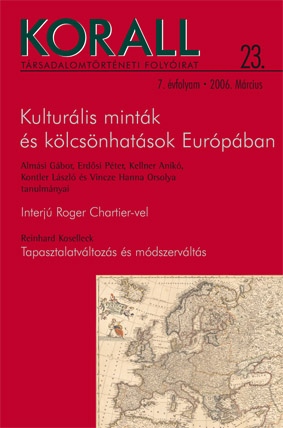William Robertson, skót történetek és német identitások. Fordítás és recepció a felvilágosodás korában
William Robertson, Scottish histories and German identities. Translation and reception in the Age
Author(s): László KontlerSubject(s): History
Published by: KORALL Társadalomtörténeti Egyesület
Summary/Abstract: This article contributes to the discussion on the „unity versus diversity of the Enlightenment” through the examination of the contemporary German reception of some of the works of the renowned Scottish historian William Robertson in translations, reviews, references, „native” texts of similar topic and inspiration, etc. Th e works in question concern national histories: those of Scotland and Germany, predominantly in the 16th century, which Robertson regarded as pivotal in the transition to modernity. In an attempt to re-focus national historical inquiry by superseding a sham patriotism based on partisanship and the search for vainglory, Robertson predicated his own approach of enlightened „impartiality” to these subjects on a comparative study of social and cultural structures, and relied on the conceptual and theoretical arsenal of conjectural or „stadial” history. One of the difficulties the contemporary German interpreters did not quite cope with, had to do with the rather specifi c vocabulary employed in these paradigms. More importantly, Robertson’s German translators and commentators seem to have been more interested in precisely the partisan aspects of his books (Mary Stuart versus Elizabeth I, Protestants versus Catholics, etc.), which were intended to be suppressed in the original. In view of the dominant approaches in contemporary German historical scholarship, this should not be surprising. Th ough there were voices that demanded a broader horizon for German history as well as the application of standards similar to those of Robertson’s, the relevant texts of historians explicitly or implicitly regarded as his counterparts are marked with openly avowed political-ideological bias and an inward-looking search for the roots of modern „liberty” – the rule of law under strong (monarchical) government – not in the elimination of feudalism and the subsequent inability of monarchs to wield the plenitude of sovereign power, but the blessings of the imperial constitution. As in many other cases of communication in the enlightened republic of letters, the questions were to a great extent similar, but the stakes, the strategies and the answers fundamentally diff erent: the problems which from Robertson’s Scottish perspective called for a cosmopolitan and non-partisan treatment, continued to be discussed in precisely the opposite terms in the German reception of his writings relevant to national history.
Journal: Korall - Társadalomtörténeti folyóirat
- Issue Year: 2006
- Issue No: 23
- Page Range: 133-154
- Page Count: 22
- Language: Hungarian

